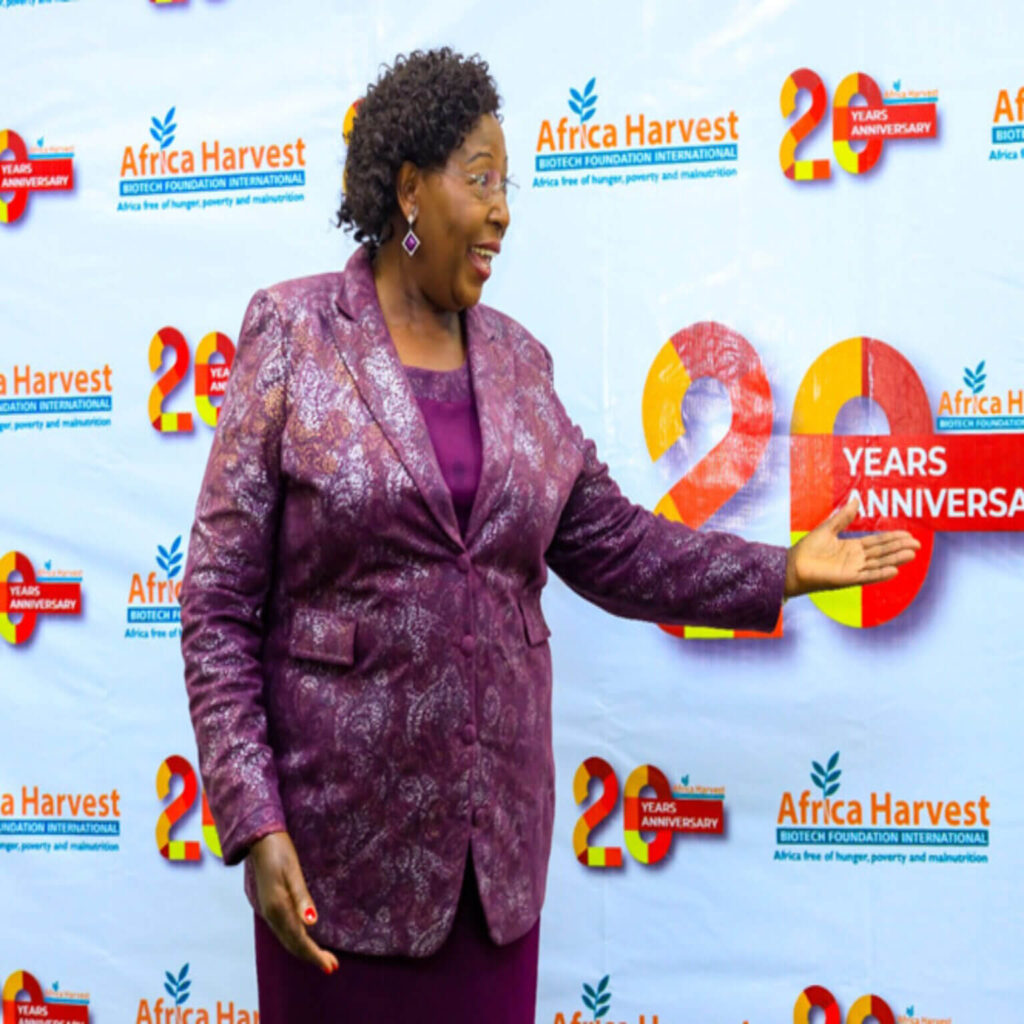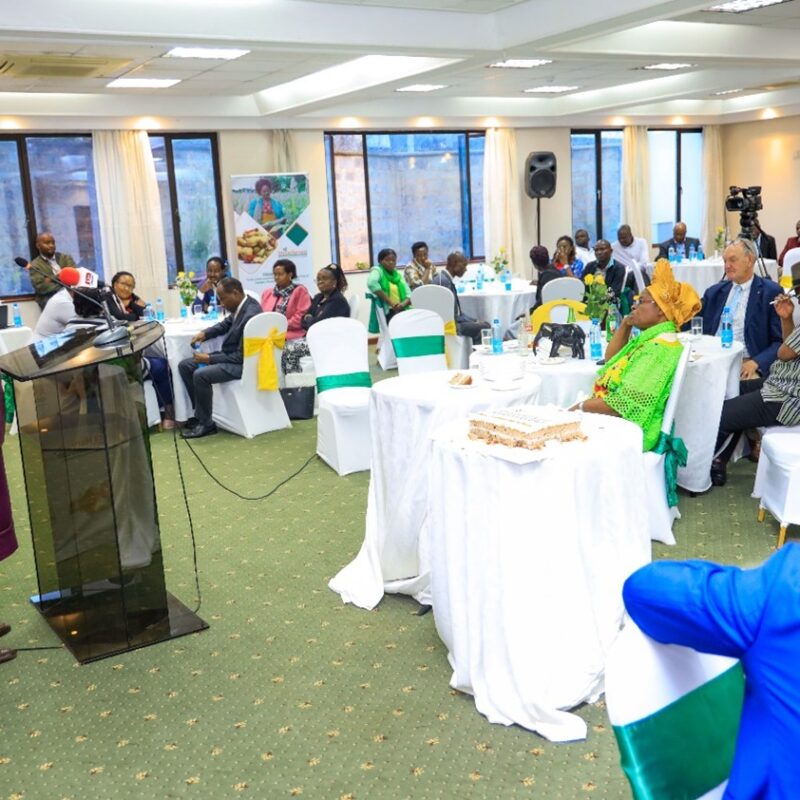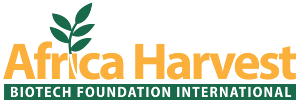
Soaring Above The Storms: Celebrating 20 Years Of Changing Lives And Launching The 2023-27 Strategic Plan
Starting an organization and sustaining its mission are two different ball games that only a few can fully understand! It is therefore quite monumental that Africa Harvest celebrated its 20 year anniversary on 17th Nov 2022, appreciating the enormous transformation the organization has experienced from an idea and a dream for better Africa 20 years ago to the now life changing institution that has positively touched over 652,000 households and millions of beneficiaries through more than 26 different projects across 12 countries.
Rosy as it sounds, this achievement has had its fair share of ups and downs, including delicate maneuvers through new and emerging agro-ecological constraints such as frequent droughts, poor technologies, pests and diseases; not forgetting the challenging policy environments that characterize many parts of the geographies in which we work and most recently Covid-19 pandemic that disrupted global systems. Through it all, our two decades of hands-on experience has given us great lessons, key among them that it takes strong leadership, passion, focus on the mission and effective partnership to deliver lasting impact.
Zooming closer, the celebration looked at the last 10 years of successful implementation of our 2012-2022 strategic plan whose aim was to be a lead contributor in making Africa free of hunger, poverty and malnutrition. The vision and mission of Africa Harvest are still relevant in Africa today and in the coming years. The achievements made through the 2012- 2022 Strategic Plan are a building block for the future, starting with the 2023-2027 period.

A look into the Last Ten years (2012-2022)
During the 10 years since 2012, Africa Harvest made significant strides in the achievement of its vision and mission. From a mere 2 crop value chains, the institution has expanded scope to bring into its fold 10 crop value chains, 2 short-cycle Livestock value chains (improved Poultry and Goats) and diversified interventions to include community-based water infrastructure; sand dams and earth dams in semi-arid areas like Makueni County. Another key achievement was the expansion of the institution’s footprint across the Africa Continent from 2 Countries in 2012 (Kenya and Tanzania), to 12 Countries by 2022, covering Eastern, Southern, Western and Central Africa. In addition, the establishment of Blossom Markets Development Limited as a social enterprise to bridge the gap in seed systems in traditional crops and value chains, especially the Drought Tolerant Crops is another achievement made during the last 10 years. These achievements would not have been possible without strategic partnerships with both the public and private sector actors including national and international research organizations like KALRO, ICRISAT, IITA and AfricaRice among others.
Efforts to enhance the ability of smallholder farmers and their organizations to thrive as sustainable business units are often hampered by several factors including the short programming cycle of rural based agricultural projects.
There’s evidence to make the case for the development of community-level entrepreneurs to support aggregation of produce from smallholder farmers, as a means to attaining scale and enhancing the appeal to large scale off-takers. To achieve a grander scale, the most sustainable option is to engage a private sector commercial-based off-taker of the target produce who is willing to invest in the value chain to either diversify their input supply chain or develop an alternative to costly imports. In addition, an inclusive business model is needed to provide a sustainable bridge between smallholder producers and the commercial off-taker through aggregation for large volumes, quality assurance and reliable supply. This has the net effect of enhanced efficiencies and optimizing resource utilizing and therefore, positive return on investment. Based on this lesson and the experience in technology transfer for value chain development, Africa harvest, pioneered the piloting of the aggregator model in the Sorghum value chain, a model that has proven its efficacy in enhancing access to sustainable markets for smallholder producers in areas that the institution has been working, streamlining value chains such as Groundnuts, Sorghum, Finger Millet, High iron beans etc.
The role of Government policies in enhancing value chain development, increasing food security and the integration of smallholder producer into lucrative supply chains cannot be underestimated. Supportive policies are both a necessary and sufficient conditions needed to give a shot in the arm of value chain streamlining efforts. They can as well negatively impact development initiatives and sometimes erode gains made if not well thought through. A case in point is when the government of Kenya reintroduced a 50% excise duty on sorghum-based beer in 2014, which led to a significant decline in demand for sorghum whose production was majorly from smallholder farmers who suffered the brunt of this policy directive. However, as the adage has it, every cloud has a silver lining. This necessitated the program to quickly identify other market outlets to cushion the smallholder farmers. It is therefore important in the design of projects to start with the market in mind, to provide diversified options to smallholder farmers.

Engagement of the market players should be quite strategic through a process of co-designing of solutions, to come up with appropriate and inclusive business cases/models. A business model is considered inclusive when farmers take up various value creation roles in the value chain; as suppliers, as owners and as employees. The SMEs who work with smallholder farmers need support to effectively provide the required services and sustain the market pull provided by large off-takers and private sector players. It is important therefore that projects seeking to streamline and develop market systems should provide appropriate support to SMEs who work with farmers by removing some of the bottlenecks that limit their performance including access to affordable financing and capacity building.
The role and impact of policy directives on smallholder farmers and the enterprises that serve them requires a keen review to ensure a supportive framework is in place. A review of results from the dissemination of innovations and technologies which lead to best practices need to be shared and disseminated to influence change of practice among smallholder farming communities and the agriculture development in general.
Most donor funded initiatives are usually time bound and must be concluded within the donor’s funding timelines. As a result, engagement with project beneficiaries is discontinued as soon as the donor timelines lapses. This eventually leads to a break in the interventions started among target beneficiaries at a time when more support and mentorship is needed for long term sustainability. Further, some of the crops supported by Africa Harvest are traditional ‘orphaned crops’ which the regulators and commercial seed companies have limited interest in due to inability to forecast demand and make a business case for investment. This leaves significant gaps for instance in the seed supply system and continued market engagement. In response to this, Africa Harvest established Blossom Markets Development Limited which will continue to engage with farmers by providing market solutions post-project funding.
Interventions targeting smallholder farmers should proffer a wholistic solution set in, addressing the multiple needs which include access to quality and improved technologies, inputs, skills required to improve production and productivity, market information, mechanization and financing among others. Farmers should therefore be given multiple solutions instead of standalone interventions. Based on this lesson, Africa Harvest adopted and has been promoting using a whole value chain approach to deliver sustainable solutions and results. This approach will be scaled during the 2023-2027 strategy period and will remain a key delivery approach for the organization as it seeks to reach many deserving smallholder farmers in West, East, SADC and Central Africa
Extension service delivery can be made more efficient through partnership as well as the use ICT based interventions and platform. Africa Harvest has always complimented government extension structures to deliver extension and farmer advisory services to farmers, thus making the work efficient and sustainable. Going forward, there will be a need to maximize opportunities from ICT based solutions and platform to bring greater efficiency and scale in extension service delivery. The organization has developed one online learning platform which will continue to be strengthened/expanded while exploring other opportunities to supporting scaling and traceability like block chain technologies and artificial intelligence.
Looking Forward: The Launch of 2023-27 Strategic plan
The new strategic plan is designed to consolidate gains from the last 20 years of our work in Africa, adding relevant innovations in agriculture and creating meaningful Jobs for the Youth.
The work done by Africa Harvest in technology dissemination, value chain development and rural development contributes to advancing the following United Nations Sustainable Development Goals (SDGs):
SDG #1: End poverty in all its forms everywhere
SDG # 2: End hunger, achieve food security and improved nutrition and promote sustainable agriculture.
SDG # 3: Tackling poverty and malnutrition, development interventions focus on hunger
SDG# 5: Achieving gender equality and empower all women and girls.
SDG # 6: Ensure availability and sustainable water and sanitation for all
SDG # 13: Action to combat climate change and its impacts.
SDG #15: Protect, restore and promote sustainably use of terrestrial ecosystems, sustainably manage forests, combat desertification and halt and reverse land degradation and halt biodiversity loss

The 2023-2027 strategy will focus on 8 key points namely: 1. Market systems development, for sustainable value chain development 2. Balancing the portfolio of project/programs by deepening while expanding geographically 3. Incorporating strategies for building resilience to climate change in programming 4. Strengthening monitoring, evaluation and learning capacity for continuous tracking of impact 5. Commitment to developing programs that create employment for the youth in Africa 6. Leveraging Information Technology (IT) in programming, coordination and monitoring 7. Strengthening systems and structures to effectively support geographical expansion while ensuring that everyone is embracing the vision of the organization 8. Developing an effective communication, partnership and resource mobilization strategy.



